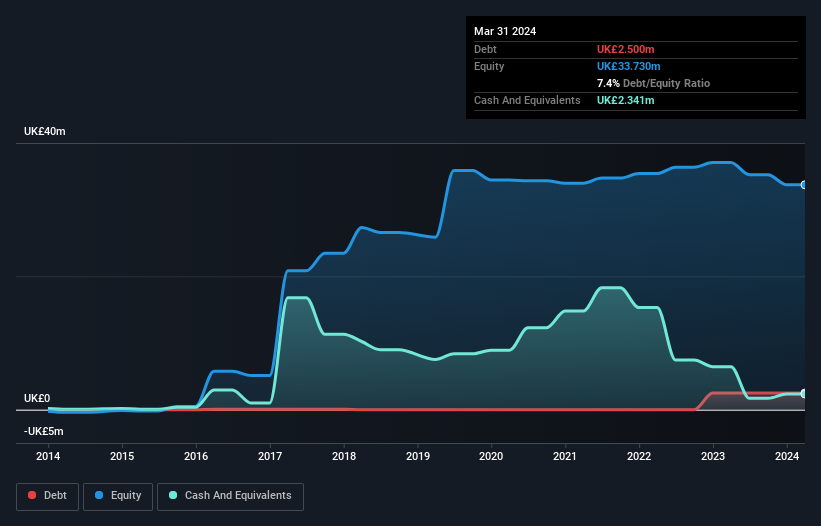Warren Buffett famously said, 'Volatility is far from synonymous with risk.' It's only natural to consider a company's balance sheet when you examine how risky it is, since debt is often involved when a business collapses. We note that Totally plc (LON:TLY) does have debt on its balance sheet. But is this debt a concern to shareholders?
Why Does Debt Bring Risk?
Debt is a tool to help businesses grow, but if a business is incapable of paying off its lenders, then it exists at their mercy. Ultimately, if the company can't fulfill its legal obligations to repay debt, shareholders could walk away with nothing. However, a more usual (but still expensive) situation is where a company must dilute shareholders at a cheap share price simply to get debt under control. By replacing dilution, though, debt can be an extremely good tool for businesses that need capital to invest in growth at high rates of return. When we examine debt levels, we first consider both cash and debt levels, together.
View our latest analysis for Totally
How Much Debt Does Totally Carry?
The chart below, which you can click on for greater detail, shows that Totally had UK£2.50m in debt in March 2024; about the same as the year before. However, it also had UK£2.34m in cash, and so its net debt is UK£159.0k.

A Look At Totally's Liabilities
Zooming in on the latest balance sheet data, we can see that Totally had liabilities of UK£27.1m due within 12 months and liabilities of UK£2.46m due beyond that. On the other hand, it had cash of UK£2.34m and UK£11.1m worth of receivables due within a year. So its liabilities total UK£16.1m more than the combination of its cash and short-term receivables.
Given this deficit is actually higher than the company's market capitalization of UK£16.1m, we think shareholders really should watch Totally's debt levels, like a parent watching their child ride a bike for the first time. Hypothetically, extremely heavy dilution would be required if the company were forced to pay down its liabilities by raising capital at the current share price. Totally has a very little net debt but plenty of other liabilities weighing it down. When analysing debt levels, the balance sheet is the obvious place to start. But it is future earnings, more than anything, that will determine Totally's ability to maintain a healthy balance sheet going forward. So if you want to see what the professionals think, you might find this free report on analyst profit forecasts to be interesting.
Over 12 months, Totally made a loss at the EBIT level, and saw its revenue drop to UK£107m, which is a fall of 21%. That makes us nervous, to say the least.
Caveat Emptor
Not only did Totally's revenue slip over the last twelve months, but it also produced negative earnings before interest and tax (EBIT). Its EBIT loss was a whopping UK£2.6m. When we look at that alongside the significant liabilities, we're not particularly confident about the company. We'd want to see some strong near-term improvements before getting too interested in the stock. Not least because it had negative free cash flow of UK£2.3m over the last twelve months. That means it's on the risky side of things. There's no doubt that we learn most about debt from the balance sheet. However, not all investment risk resides within the balance sheet - far from it. For example Totally has 2 warning signs (and 1 which makes us a bit uncomfortable) we think you should know about.
If you're interested in investing in businesses that can grow profits without the burden of debt, then check out this free list of growing businesses that have net cash on the balance sheet.
Valuation is complex, but we're here to simplify it.
Discover if Totally might be undervalued or overvalued with our detailed analysis, featuring fair value estimates, potential risks, dividends, insider trades, and its financial condition.
Access Free AnalysisHave feedback on this article? Concerned about the content? Get in touch with us directly. Alternatively, email editorial-team (at) simplywallst.com.
This article by Simply Wall St is general in nature. We provide commentary based on historical data and analyst forecasts only using an unbiased methodology and our articles are not intended to be financial advice. It does not constitute a recommendation to buy or sell any stock, and does not take account of your objectives, or your financial situation. We aim to bring you long-term focused analysis driven by fundamental data. Note that our analysis may not factor in the latest price-sensitive company announcements or qualitative material. Simply Wall St has no position in any stocks mentioned.
Have feedback on this article? Concerned about the content? Get in touch with us directly. Alternatively, email editorial-team@simplywallst.com
About AIM:TLY
Good value low.
Market Insights
Community Narratives



